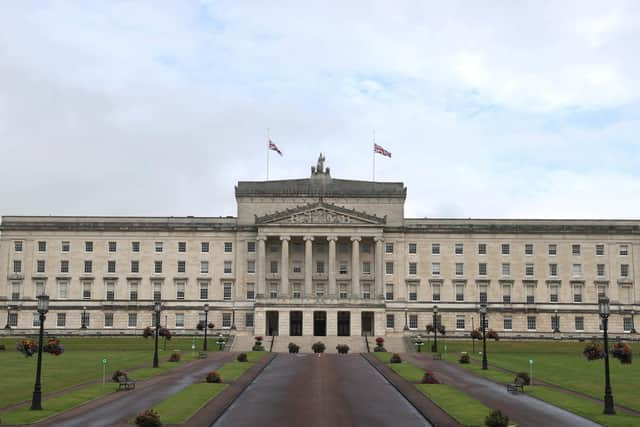Economist explains how Stormont will shoulder burden of extra £2.45 billion cost on major capital projects after scathing Audit Office report
and live on Freeview channel 276
That is the analysis of leading NI economist Dr Esmond Birnie, who also said that the situation was so challenging that he wondered if some of the flagship capital projects might ever be completed.
On Monday the NI Audit Office reported that NI’s major capital projects portfolio will cost £2.45bn more to complete than originally estimated.
Advertisement
Hide AdAdvertisement
Hide AdThe report provided an overview of progress on 11 projects previously covered in a 2019 report, including seven flagship projects identified by the Stormont Executive in 2015 as highest priority.


The seven flagship projects are the A5 road, the A6 road, Belfast rapid transit, Belfast transport hub, the Maternity and Children’s Hospital, regional and sub-regional stadia, and the NI Fire and Rescue Learning and Development Centre in Cookstown.
The Belfast rapid transit project is the only flagship project to have been fully completed.
An additional four projects which the report said had experienced problems are the critical care centre at the Royal Victoria Hospital, primary community care centres at Lisburn and Newry, Ulster University’s greater Belfast development, and the Strule shared education campus.
Advertisement
Hide AdAdvertisement
Hide AdAsked for where the money would come from to complete the projects, Ulster University economist Dr Esmond Birnie said it was "just one more hole to add to an already very fragile position".
He added: "The answer is that because the sum is so large it is very hard to see where the money can come from. The Executive could, of course, create some funds to invest in capital projects by either increasing the Regional Rate substantially or by introducing domestic water charges - or both. But, since devolution has been restored the Executive Parties have been tripping over each other to rule out almost any form of revenue raising.”
He noted that the Executive has limited borrowing powers.
"No doubt there will be yet more appeals for extra cash from HM Treasury but expect the Exchequer to take a very dim view of Stormont’s capital budget track record."
In any case, he said, the current funding of £3.3bn from the Treasury "looks like about as good as it gets".
Advertisement
Hide AdAdvertisement
Hide Ad"It is very likely that the Executive will have to resort to spreading out some of these projects over even more years. That obviously impacts on services. One wonders if some of the 77 projects, even some of the 11 projects – or the flagship projects - will ever get finished. “
The Audit Office report notes that, over the past 10 years, there has been a series of reviews by various bodies on the matter.
Collectively, the report said these have highlighted “significant weaknesses” in the commissioning and delivery system for major capital projects, as well as the “need for enhanced governance and improved staffing capacity and capability”.
The reasons for delays may, in part, be due to the pandemic, inflation and global political factors.
Advertisement
Hide AdAdvertisement
Hide AdBut even so, it said, it was “extremely concerning” that over four years after its last report on the issue “there is little evidence of improvement or past lessons learned being applied to new projects”.
Comment Guidelines
National World encourages reader discussion on our stories. User feedback, insights and back-and-forth exchanges add a rich layer of context to reporting. Please review our Community Guidelines before commenting.